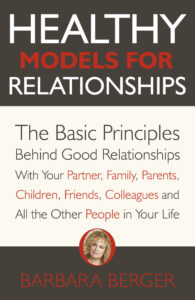
By Barbara Berger/ www.o-books.com
It’s difficult to communicate respectfully with other people if we don’t understand what healthy boundaries actually looks like in real life. So, unfortunately, because we are often at a loss when it comes to identifying boundary violations, we cannot figure out what actually happened in the various interactions in our life. What we do usually know is that we were in a situation with someone and we felt discomfort. Something didn’t feel right, but we couldn’t quite understand or identify what actually happened so it was difficult to analyze the situation – and thus take constructive action next time one finds oneself in such a situation..
So to help us see and identify boundary violations in a more concrete way here are some of the most common boundary violations. For each of the boundary violations listed below, you can be the one who violates another person’s boundaries or you can be on the receiving end of such a boundary violation.
- Giving someone advice when the person didn’t ask for your opinion
- So good questions to ask yourself are:
- Do I give other people advice without them asking me for it?
- Is someone else giving me advice without me asking for it?
- So good questions to ask yourself are:
- Telling another person how they “should” think or feel or live their life (when the person didn’t ask for your opinion)
- So good questions to ask yourself are:
- Do I tell other people how they should think, feel or live their lives when they didn’t ask me for my advice?
- Is someone else telling me how to think, feel or live my life when I didn’t ask for their advice or opinion?
- So good questions to ask yourself are:
- Judging another person’s lifestyle and making him or her “wrong” because he/she is different from you
- So good questions to ask yourself are:
- Am I making someone “wrong” because he/she is different from me?
- Is someone else making me “wrong” because I do things differently than they do?
- So good questions to ask yourself are:
- Telling another person you know better than he/she does, what or how the person is actually thinking or feeling
- So good questions to ask yourself are:
- Do I have a tendency to tell other people that I know better than they do, what or how they are thinking or feeling?
- Is someone else telling me that he/she knows better than I do what or how I am thinking and feeling?
- So good questions to ask yourself are:
- Making another person responsible for how you feel or what you are saying and doing
- So good questions to ask yourself are:
- Am I blaming someone or making someone else responsible for how I feel or for what I am saying and doing?
- Is someone else blaming me or making me responsible for their feelings or for what they are saying or doing?
- So good questions to ask yourself are:
- Touching another person’s body without their permission
- So good questions to ask yourself are:
- Do I touch other people without their permission?
- Do other people (or someone specific) touch me without my permission?
- So good questions to ask yourself are:
- Going through another person’s personal possessions (like their phone or computer or bag) without their permission
- So good questions to ask yourself are:
- Do I go through someone else’s personal possessions without their permission?
- Is someone I know going through my personal possessions without my permission?
- So good questions to ask yourself are:
- Any kind of threatening, aggressive or violent behavior
- So good questions to ask yourself are:
- Do I shout or threaten other people or act violently towards others?
- Is there someone in my life who shouts, threatens me or is violent towards me?
- In cases like this, it is important to remember that we live in societies where there are laws to protect each of us from violence and abuse and that this type of behavior is completely unacceptable. If you encounter this kind of a situation, leave as quickly as possible or call the police or your neighbors if you need help.
- So good questions to ask yourself are:
Exceptions to minding your own business
When we understand what constitutes boundary violations, we can then understand why a good general rule is to Mind Your Own Business! This means that unless someone asks for your opinion or advice or invites you into their space or life situation, stay in your own space. And mind your own business! This is a good general rule, but of course there are some important exceptions to this rule.
In brief, you are not supposed to mind your own business when you and another person have a shared project (like a home or children or a work project). Then you are both involved and you have just as much right to your ideas and opinions as the other person. When we have shared projects, it’s more a question of how to communicate respectfully and reach workable compromises if we disagree as to how to deal with whatever the matter is (again, for example, the house, the children, the family vacation, the project at work, etc.).
There are a few other very important exceptions to Minding Your Own Business.
The first is obvious – that it’s the job of parents of small children to take care of them and mind their business! But as children grow up and begin to take more and more charge of themselves and their lives, it is the job of the wise parent to back off and trust in the intelligence of their children.
The second is when we go to a therapist or doctor or expert of some kind and specifically ask for (and often pay for) this person’s advice.
The third is when we are witness to abuse or violence of any kind. Then it’s our job, our business, our responsibility to step in and stand up for the victims, whether it’s a child or a woman being abused in a relationship or any other kind of abuse. When we do not interfere and stand up for respect and justice for all human beings, we are actually enabling the abuse to take place and are, in fact, also a guilty party in the situation.
For guidelines and suggestions about how to deal with boundary violations, see my books “Find and Follow Your Inner Compass” (Part 2) and “Healthy Models for Relationships – The Basic Principles Behind Good Relationships”.
***********
Healthy Models for Relationships by Barbara Berger is available from www.o-books.com and from wherever books are sold.
BOOK LINK: https://www.johnhuntpublishing.com/o-books/our-books/healthy-models-relationships